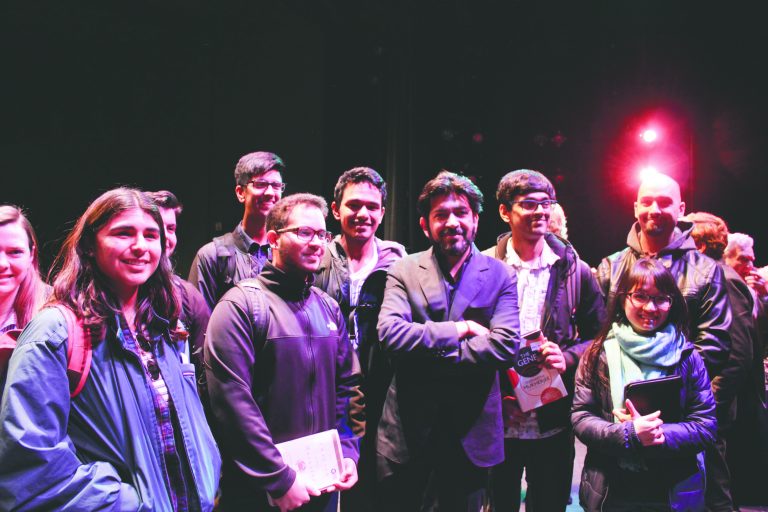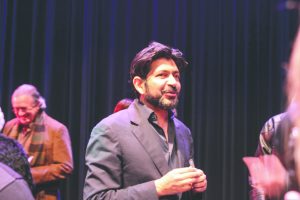
Amariyanna Anderson
Dr. Siddhartha Mukherjee is a professor, physician, biological scientist, and a renowned author. Mukherjee attended Stanford University, University of Oxford, Harvard Medical School, and is currently an assistant professor of medicine in the Department of Medicine at Columbia University in New York City. His book “The Emperor of all Maladies: A Biography of Cancer,” written to answer a patient’s question, won the Pulitzer Award. Mukherjee gave a talk entitled “From Genes to Cancer and Back” in Campbell Hall on Thursday.
He began with two questions: Is transgenderism genetic and is race genetic? Mukherjee also shared the latest National Institutes of Health decision to allow genetic modification on embryos, sperm, and eggs that qualify as being of extraordinary suffering. What is “extraordinary suffering” and who gets to decide the actual definition? Mukherjee broke the lecture into five parts.
In Part 1: The Discovery of Genes (1865-1935), he reviewed how Gregor Mendel bred a variety of plants to learn that particles move from parent to offspring. Archibald Garrod later rediscovered Mendel’s work when he was looking into a disease.
In the second part, Deciphering the Mechanism of Inheritance(1930-1970), Mukherjee elaborated on the structure and function of genes. Rosalind Franklin was one of the first to take pictures of DNA and was one of the contributors to the discovery of the double helix, also known as the “Most Beautiful Genome.”

Mukherjee also shared how genes work, which researchers discovered in the 1950s. He said when it was first looked at, it was seen as a transformation from gene to message to form. It was later seen as a hardware, code, and decoding process. Finally, children are now taught in common early education to look at it as the process of DNA to RNA to protein.
In Part 3: Sequencing and Cloning of Genes (1970-2001), the audience learned about some of the pioneers of late 20th century genetic research, including Frederick Sanger, one of the first known people to “read” DNA. One of Mukherjee’s teachers at Stanford, Paul Berg, was in fact one of the first to write genetic medication, receiving a Nobel Prize in Chemistry with Sanger and Walter Gilbert.
Once people started to read and write genes, the world was introduced to the birth of genetic medicine. Berg put together the Asilomar Conference, which included biologists, lawyers, and other physicians, in 1975, to speak about safety hazards and regulations on the use of biotechnology and DNA technology.
Part 4: Human Genetics and Gene Therapy, ended up with the audience learning about the Human Genome Project of 2011. The goal of the Human Genome Project was to attempt to read the code of the human genome. Mukherjee spoke about the 3 Principles.
- Recipe vs. Blueprint
There is never just one gene. Genes in the genome are more like a recipe than a blueprint and this brings about difficulty in curing diseases.
- Genes + Environment + Chance
Many diseases (not all) are born because certain genes may be introduced to an environment foreign to their general genome sequence. Chance in genetics and the terminology of “penetrance” defined by the NIH as “the percentage of individuals with a given genotype who exhibit the phenotype associated with that genotype” is also a major factor, especially when it’s something that may be hereditary.
- Variation vs. Consistency
Within humans, there is an enormous variation that we all look different; but there is enough consistency in which most of us all have two ears, two eyes, 10 fingers and toes, etc. Cancer is not one gene, as it may look the same under the microscope but differs genetically. Everyone’s cancer is their own specific cancer.
Ending his speech with Part 5: The Future of the Future (2000-2016), Mukherjee introduced the reality of what we should expect in the future. He estimates the first germ line baby wil appear within 3-4 years. As a result, scientists are questioning, “How Will it Impact Culture and the World today?” The answer includes the morality and opinions of the people. You have to look into penetrance, allowing people to make genetic choices, freedom of choice, and to answer the question of what exactly qualifies as extraordinary suffering.
Mukherjee brought amazing unbiased and well informed research to allow knowledge as well as opinion to circulate in Campbell Hall.
















